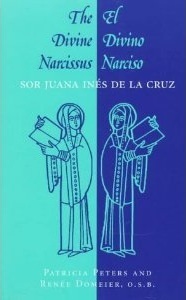Take a photo of a barcode or cover
In the interest of honesty, I read this play as part of a lecture course for university. We are discussing American theatre (emphasis on American, as this includes all the Americas not just U.S America), and its development from the 16th century onward. I also did not read this exact edition, my teacher provided us with a scanned copy as most of us did not have our textbooks yet. The translation I read was done by Patricia A. Peters and Renée Domeier.
There are some interesting concepts raised in the Loa by Sor Juana. In a time when morality plays and theatre were being used for the conversion of indigenous populations she wrote a play that provides a two-sided discussion. Not only that, she provides a look into the indigenous characters religion and life. Now it is important to note that just because she offers a more character based story (instead of just focusing on morality and Catholicism) doesn't mean she does not hold a biased view of indigenous cultures. Depending on how you read the play it could imply that the indigenous characters representing the Americas and the west are converted to Catholicism, or it could be hinting that the indigenous representing characters and the Spanish representing characters come to an understanding that their religions are similar.
My class had an extensive discussion about the fact that this play seems to be subtly commenting on the contradictory narrative conversion plays use. We thought this because there is a moment in the play when the Spanish representing character, Religion, tells the indigenous representing characters, Occident and America, that they misinterpret her affection as violence. This is a contradictory message, as she wages war against them because they would not listen to her dialogue about how her god is the true god. When they point out that she has used violence and force to get her way she refers to it as truly coming from a place of 'affection.' My class also realized that even if this play is a commentary, the message is rather subtle and the audience consuming this literature during the time period would not receive it in the context we (as students today) do.
Overall, it is an intriguing read, especially as some of the discussion and dialogue about religion is quite impressive considering the time period. And especially as the author is a woman who defied the limits of the time period and found a way to get an education and become literate by being a nun. While her story does not end well she created some interesting works and provided some valuable insight into the time period from an unlikely perspective.
There are some interesting concepts raised in the Loa by Sor Juana. In a time when morality plays and theatre were being used for the conversion of indigenous populations she wrote a play that provides a two-sided discussion. Not only that, she provides a look into the indigenous characters religion and life. Now it is important to note that just because she offers a more character based story (instead of just focusing on morality and Catholicism) doesn't mean she does not hold a biased view of indigenous cultures. Depending on how you read the play it could imply that the indigenous characters representing the Americas and the west are converted to Catholicism, or it could be hinting that the indigenous representing characters and the Spanish representing characters come to an understanding that their religions are similar.
My class had an extensive discussion about the fact that this play seems to be subtly commenting on the contradictory narrative conversion plays use. We thought this because there is a moment in the play when the Spanish representing character, Religion, tells the indigenous representing characters, Occident and America, that they misinterpret her affection as violence. This is a contradictory message, as she wages war against them because they would not listen to her dialogue about how her god is the true god. When they point out that she has used violence and force to get her way she refers to it as truly coming from a place of 'affection.' My class also realized that even if this play is a commentary, the message is rather subtle and the audience consuming this literature during the time period would not receive it in the context we (as students today) do.
Overall, it is an intriguing read, especially as some of the discussion and dialogue about religion is quite impressive considering the time period. And especially as the author is a woman who defied the limits of the time period and found a way to get an education and become literate by being a nun. While her story does not end well she created some interesting works and provided some valuable insight into the time period from an unlikely perspective.
"...su misma semejanza contemplando / está en ella, y mirando / a la Naturaleza Humana en ella. / ¡Oh fatales destinos de mi estrella! / ¡Cuánto temí que clara la mirase, / para que de ella no se enamorase, / y en fin ha sucedido!"
"He is contemplating his own likeness and seeing Human Nature. O fatal destiny of my star! How I feared that if he saw her clearly, he would fall in love with her, and finally it has happened!"
All the usual qualifications apply (colonial works are colonial; works written on commission reflect the values of the commissioner; autos sacramentales are inevitably heavy-handed allegories). But wow, this is beautifully written. Her lyrical gymnastics are remarkable—especially in the Echo and Narcissus conversations!!! The opening loa bending Aztec beliefs to sound Christian, the entire play bending the Narcissus myth to sound Christian, it's all immaculately constructed if problematic in a thousand ways. The sheer CRAFT here, though. SOR JUANA............MY FOREVER FAV.
No sé qué opino de este libro, quiero decir, esta bien escrito y tiene una muy buena estructura pero me ha aburrido demasiado y no he conectado, realmente no sé si he captado el punto totalmente. Casi logra gustarme pero no realmente no lo he disfrutado, pude apreciar lo bueno que es pero no conectamos, tal vez en un futuro vuelva a leerlo.



